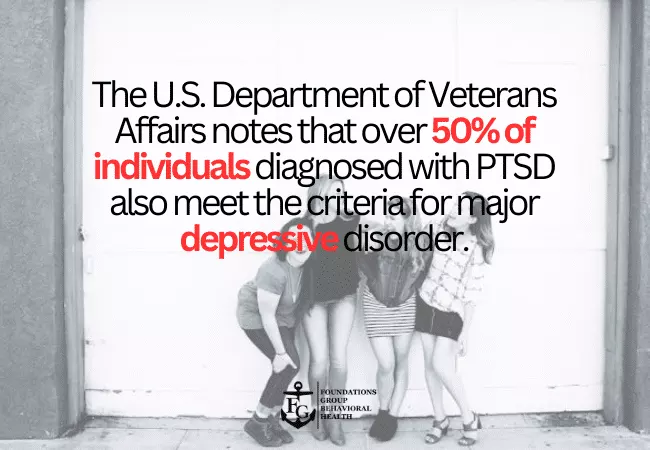Comorbid disorders, also known as co-occurring disorders, refer to the presence of two or more mental health conditions within the same individual. These disorders often influence and exacerbate each other, making diagnosis and treatment more complex. At Foundations Group Behavioral Health, our mission is to provide specialized, compassionate care tailored to the unique needs of individuals facing comorbid disorders. Through programs like our Psychiatric Day Treatment, Half Day Treatment Program, and Outpatient Mental Health Program, we help patients achieve lasting recovery and improved mental well-being.
What Are Comorbid Disorders?
Comorbid disorders occur when a person experiences multiple psychiatric or behavioral health conditions simultaneously. These disorders can range from mood disorders such as depression and bipolar disorder to anxiety disorders, trauma-related conditions, and even substance use disorders.
Examples of Common Comorbid Disorders:
- Depression and Anxiety Disorders: Depression and anxiety often co-occur, creating a cycle of symptoms such as persistent sadness, worry, irritability, and physical tension.
- Bipolar Disorder and Substance Use Disorders: Individuals with bipolar disorder may turn to alcohol or drugs to self-medicate mood swings, leading to dependency.
- PTSD and Depression: The emotional toll of trauma can result in both PTSD symptoms (flashbacks, hypervigilance) and depression (loss of interest, low energy).
- Obsessive-Compulsive Disorder (OCD) and Generalized Anxiety Disorder (GAD): The intrusive thoughts of OCD can amplify the chronic worry of GAD, leading to debilitating distress.
What Causes Comorbid Disorders?
The development of comorbid disorders is influenced by a combination of biological, psychological, and environmental factors. Understanding these causes helps us design more effective treatment plans.
Key Contributing Factors:
- Shared Risk Factors: Genetics, brain chemistry, and early-life trauma are common risk factors for multiple mental health disorders.
- Stress and Environmental Triggers: Chronic stress, abuse, or neglect can increase vulnerability to developing multiple conditions.
- Substance Use and Mental Health: Substance use disorders frequently co-occur with mental health disorders, either as a result of self-medication or because substances exacerbate underlying conditions.
For example, individuals with bipolar disorder may use substances to manage depressive episodes, which can lead to addiction and worsen mood instability.
Why Diagnosing Comorbid Disorders Is Challenging
Diagnosing comorbid disorders is often complex due to overlapping symptoms and the interactive nature of these conditions. For example, symptoms of anxiety may be mistakenly attributed to depression, or substance use may mask the underlying mental health condition.
Common Diagnostic Challenges:
- Overlapping Symptoms: Many mental health disorders share symptoms such as fatigue, irritability, or changes in sleep patterns.
- Self-Medication: Individuals may use substances to manage symptoms, complicating the clinical picture.
- Sequential Development: One disorder may develop first and trigger the onset of another, making it difficult to identify the root cause.
The Importance of Integrated Treatment for Comorbid Disorders
Addressing comorbid disorders requires an integrated approach that treats all underlying conditions simultaneously. Traditional methods that focus on one disorder at a time often fall short, leading to incomplete recovery and higher relapse rates. At Foundations Group Behavioral Health, we specialize in treating comorbid disorders through evidence-based and holistic care.
Core Components of Integrated Treatment:
- Comprehensive Assessments: A thorough evaluation to identify all co-occurring conditions and their interactions.
- Collaborative Care: Multidisciplinary teams of psychiatrists, therapists, and counselors work together to create individualized treatment plans.
- Evidence-Based Therapies: Modalities such as Cognitive Behavioral Therapy (CBT) and Dialectical Behavior Therapy (DBT) are highly effective in addressing comorbid disorders.

Treatment Programs at Foundations Group Behavioral Health
We offer a range of programs tailored to meet the needs of individuals facing comorbid disorders:
1. Psychiatric Day Treatment
Our Psychiatric Day Treatment program provides intensive, structured support for individuals struggling with complex mental health challenges. Patients benefit from daily therapeutic interventions, psychoeducation, and skill-building sessions in a supportive environment.
2. Half Day Treatment Program
This flexible program is designed for individuals who require structured care but need to balance treatment with other responsibilities. Patients attend therapy sessions and workshops part-time, focusing on strategies to manage symptoms and improve overall well-being.
3. Outpatient Mental Health Program
Our outpatient program is ideal for individuals transitioning from more intensive care or those who require ongoing support. Through regular therapy sessions, individuals receive guidance and tools to maintain stability in their mental health.
4. Depressive Disorder Treatment Program
Depression often accompanies other mental health disorders, and our program is designed to address its root causes while managing co-occurring conditions.
5. Bipolar Disorder Treatment Program
This program focuses on stabilizing mood swings and addressing the unique challenges of bipolar disorder, particularly when combined with anxiety, depression, or substance use.
6. Co-Occurring Disorder Treatment Program
Our integrated program simultaneously treats mental health disorders and substance use issues, ensuring a comprehensive approach to recovery.
Benefits of Seeking Care at Foundations Group Behavioral Health
Choosing Foundations Group Behavioral Health means gaining access to a compassionate team dedicated to your well-being. Our Behavioral Health Treatment Center in Massachusetts is uniquely equipped to help individuals with comorbid disorders through:
- Customized Treatment Plans: Every patient receives a tailored plan based on their unique needs and goals.
- Expert Multidisciplinary Team: Our clinicians, therapists, and support staff work collaboratively to provide comprehensive care.
- Holistic Approach: We address the physical, emotional, and social aspects of recovery to promote lasting health.
Steps to Take for Recovery
Living with comorbid disorders can be overwhelming, but the right treatment makes recovery possible. Here’s how you can take the first step:
- Reach Out for Support: Contact us to schedule a consultation and learn more about our programs.
- Commit to Comprehensive Care: Integrated treatment is essential for lasting recovery.
- Build a Support Network: Recovery is a journey best taken with the support of professionals, loved ones, and peers.
At Foundations Group Behavioral Health, we are here to help you reclaim control over your mental health and achieve a brighter future.
Contact Foundations Group Behavioral Health Today
If you or someone you love is struggling with comorbid disorders, don’t wait to seek help. Our programs, including Psychiatric Day Treatment, Half Day Treatment, and our Outpatient Mental Health Program, are designed to provide the tools and support needed to overcome even the most complex challenges.
Take the first step toward recovery to learn more about our Behavioral Health Treatment Center in Massachusetts and how we can help you on your journey to wellness. Contact us today at 888.685.9730 to book your first session and begin your journey toward a more mindful future.
FAQ for Comorbid Disorders Treatment
What are comorbid disorders?
Comorbid disorders, also known as co-occurring disorders, refer to the presence of two or more mental health conditions or a combination of mental health and substance use disorders in the same individual.
What are some common examples of comorbid disorders?
Common examples include depression and anxiety, bipolar disorder and substance use disorder, PTSD and depression, or OCD and generalized anxiety disorder.
What causes comorbid disorders?
Comorbid disorders can result from genetic predisposition, shared risk factors, trauma, or environmental stressors. In some cases, substance use exacerbates existing mental health conditions.
Why is it difficult to diagnose comorbid disorders?
Overlapping symptoms and self-medication behaviors often make it challenging to differentiate between disorders or identify all underlying conditions.
What treatment options are available for comorbid disorders?
Effective treatment includes integrated approaches like psychiatric day treatment, half-day treatment programs, outpatient mental health programs, and specialized programs for depression, bipolar disorder, and co-occurring disorders.
What is integrated treatment for comorbid disorders?
Integrated treatment simultaneously addresses all co-occurring conditions, focusing on the interplay between disorders to ensure comprehensive recovery.
How can I access treatment for comorbid disorders?
You can contact Foundations Group Behavioral Health for a consultation to determine the best treatment program for your needs, including psychiatric day treatment, half-day treatment, and outpatient mental health programs.








